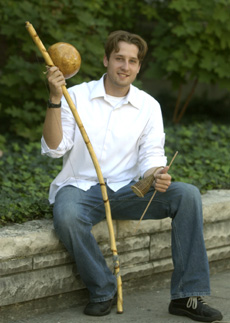Kansler promotes physical, cultural growth

Online Poster
September 30, 2004
Capoeira is an art, a dance, a game, a method of self-defense and a martial art. And for Jeff Kansler, honing his Capoeira skills has been a major part of the last three years of his life.
Kansler, graduate student in architecture and president of the Capoeira Club, described Capoeira as a game, but said it could also be performed as a fight or dance.
“My favorite aspect is the gameplay – you could be throwing kicks at a person but it is not meant to hurt them,” he said. “It is like a special kind of dialogue between the two people playing.”
He said there is history behind Capoeira.
“It was developed by African slaves in Brazil beginning in the 16th century,” Kansler said. “They were not allowed to fight but needed a way to resist the oppression of slave masters and defend themselves. So, they began Capoeira and disguised it as a game or dance to avoid being caught.”
Get The Daily Illini in your inbox!
He explained how the game is played to distinct music, comprised of drums, tambourines and a berimbau – a gourd instrument with a single wire stretched across a long pole.
“The music is a very important part of it because the game is played to the tempo,” Kansler said.
He said he was first motivated to find out more about Capoeira after he saw it in a movie and thought it seemed like a fun way to get in shape.
“I was pretty intrigued by it and I just happened to run into one of the guys who started the club here in 1999,” Kansler said. “That’s how I got involved.”
He said he learned the technique from Capoeira tapes and the club, but his progress was stalled when he left the University to study abroad in Paris. When he returned he learned that instructors from Brazil had taken interest in the club and was able to get more hands-on instruction.
One of these instructors was Denis Chiaramonte, who recently moved to the area to teach Capoeira at the University.
“He’s one of the best teachers I’ve had,” Kansler said. “I really respect how he just picked up and moved here from Brazil to teach.”
Club member Aisha Chiaramonte said she saw Kansler as very responsible and open to other cultures
“Last year, Jeff had a knee injury and was still trying to train,” Chiaramonte said. “Most people who get injured stop doing Capoeira, but he really had the drive to keep learning – even if he couldn’t physically do it, he would help out with the music.”
Shana Dobrinsky, Kansler’s friend and a graduate student, said she saw this same drive in him.
“He’s very hard-working and has got great concentration skills, which Capoeira requires,” Dobrinsky said. “He is a good leader, because people see those traits in him and want to be like that, too.”
Kansler said the exposure to the Capoeira culture drives him to practice the art, despite his demanding schedule. His involvement requires him to train for almost 10 hours over a six-day period.
“What’s great is that through Capoeira, I have learned a lot of Portuguese and also how to play the instruments that are used in it,” he said.
Peggy McMahon, Kansler’s friend, said Capoeira complimented his personality.
“When they play it, it’s more of an art form,” McMahon said. “It is aggressive but artfully aggressive, and non-combative – that fits him pretty well.”
In addition to being president of the Capoeira Club, Kansler studies architecture and is a teacher’s assistant in a statics and dynamics class. He said his other main interests include many different forms of art, including drawing, photography and music.
He said he would eventually like to move to Paris and work for a “small-to-medium-sized” architecture firm.
Kansler also said he hopes to teach Capoeira one day, but that it would probably take at least a few years of training before he could do so.
“I’d also like to become fluent in Portuguese and go to train with the masters in Brazil,” he said.
All different types of people are encouraged to try Capoeira, regardless of physical skill level, Kansler said.
“A lot of people who start out get kind of intimidated because they do not think they are capable of doing some of the moves,” he said. “But they get to the point where they can do them – it’s a great way to realize potential in yourself that you never thought you had.”






